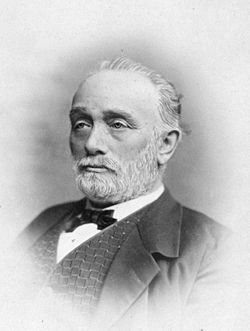Ludwig Büchner
Friedrich Karl Christian Ludwig Büchner (29 March 1824 – 1 May 1899) was a German philosopher, physiologist and physician who became one of the exponents of 19th century scientific materialism.

Büchner was born at Darmstadt, Germany, on 29 March 1824. From 1842 to 1848 he studied physics, chemistry, botany, mineralogy, philosophy and medicine at the University of Giessen. In 1852 he became lecturer in medicine at the University of Tübingen, where he published his great work Kraft und Stoff: Empirisch-naturphilosophische Studien (Force and Matter: Empiricophilosophical Studies, 1855). In this work,[1] he sought to demonstrate the indestructibility of matter and force. The extreme materialism of this work excited so much opposition that he was compelled to give up his post at Tübingen. He retired to Darmstadt, where he practiced as a physician and contributed regularly to pathological and physiological magazines.
He died at Darmstadt on 1 May 1899.
Ludwig Büchner was the brother of Georg Büchner, a famous playwright.
References
change- ↑ the product, according to Lange, of a fanatical enthusiasm for humanity
| This article includes text from the public domain 1911 Encyclopaedia Britannica. Please add to the article as needed. |
Other websites
change- Some brief excerpts from Büchner's Force and Matter Archived 2007-10-10 at the Wayback Machine